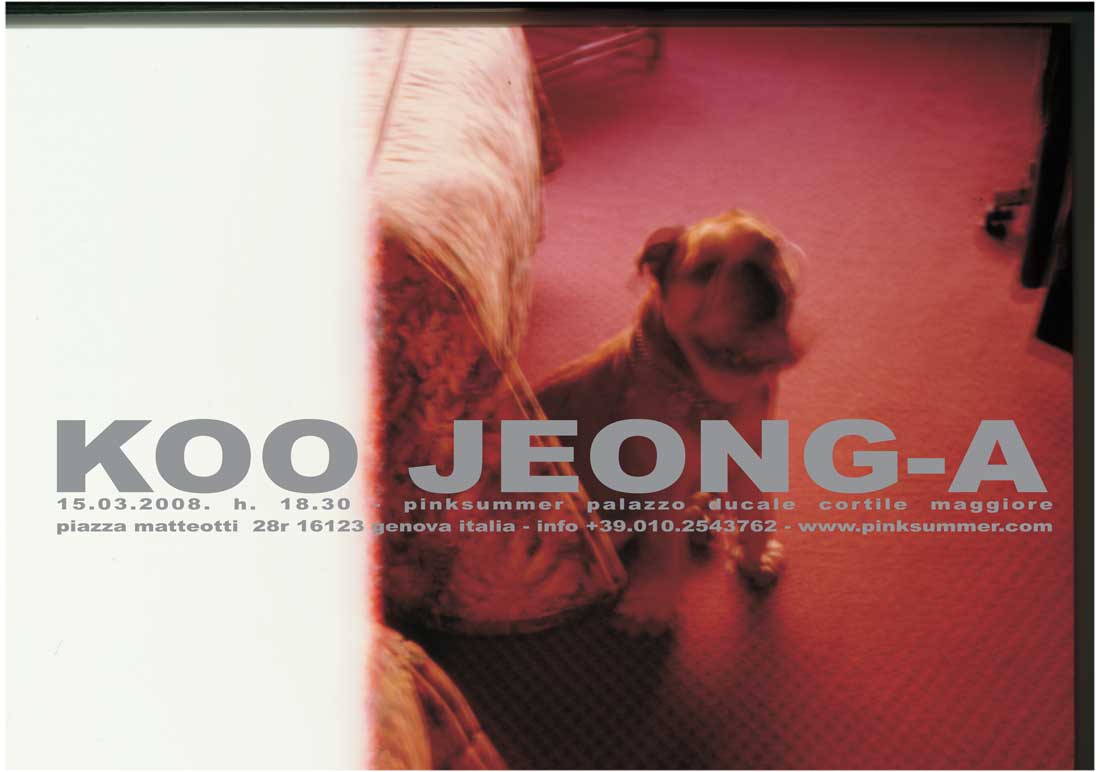Koo Jeong a

Press-release
Pinksummer: Philosophers taught us that memory is a continuum where space and time have the same substance. Regarding your work, it seems like we are facing a panorama of the memory, and nevertheless your landscapes present the discontinuity of an archipelago; interrupted areas are not offered to the look in a synthetic perspective, but in the fragmentary sight of the glimpse; to classify the whole it is necessary to use intuition that can never be objective, and in this way escapes description. Is this the substantial difference that exists between memory and nostalgia?
Koo Jeong-A: I am interested to newered/renewed everyday state, illness or environment issues and am allergic to static memory, nostalgia, melancholia, sentimentalgia.
P: The “esegetes” of your work make often use of adjectives like discreet, furtive and also of the concept of paradox in relation to your necessity of showing yourself hiding or perhaps just protecting from architectures, maybe just made of sugar, by thin and impalpable boundaries as a fragrant essence can be, in the end, by the intangibility of your interventions. Do you need to define the I (it is told with an attention that grazes obsession), before letting yourself be discovered by the other?
K J-A: Esegetes??? The question of about life is : I am in or I am out.
P: It is said that to understand your work it is necessary to understand the meaning of the word Ousss, a neologism that you tried to introduce in the Larousse. If it is asked to you what meaning this word has, you simply affirm that you like to pronounce it. We thought of the platonic Cratilo, on the dilemma about the divine or conventional nature of the language, on the relation that exists between language and things, between ourselves and those things, between us and we. Ousss seems an onomatopoeic positive word, a shelter within an intimacy that seeks company, and nevertheless it rationally represents an impossibility. Which is your relationship with words?
K J-A: It was starting with Flammarion published by Yvon Lambert became my book “Flammariousss”, Larousse, Robert, they still has their dictionary, they didn’t want to give us as a digital file. But Flammarion, yes, as they do not publish any more dictionary. The relation with words seems for me is the comfort notion by non understanding of others. It is a violation about not knowing.
P: The first idea for a project at pinksummer was a large mothball: governmental laws, the same that oblige us to put seatbelts in cars and helmets in motorcycles, have protected us from your project. Someone wrote that only phantoms can resist the stench of mothballs. Detaining phantoms from oblivion is somehow a way to oppose the caducity of things, yet recognising its transient and effemera nature. There is a pop song that says that our life isn’t that much, that we fade like roses, and that time with our pains and our sadness sews up its coats, that destiny doesn’t give anything and promises everything and that happiness is quite reachable but when you try to, you get crazy. Is mothball an illusion to oppose destiny?
K J-A: Maybe I am a phantom, we will test it in Berlin on may 2008.
P: What will you present at pinksummer?
K J-A: I will present “Dreams & Thoughts”, “R” in dvd, some more that I am still working.
At 10.00 pm pinksummer invites you to a party event with sound ambient by Port-royal at the munizioniere of Palazzo Ducale, Genova.


